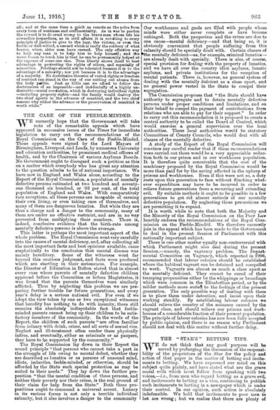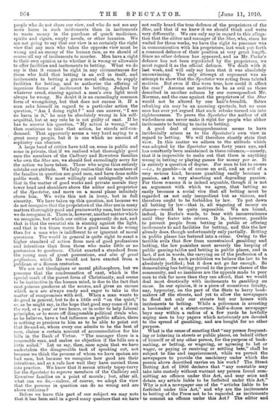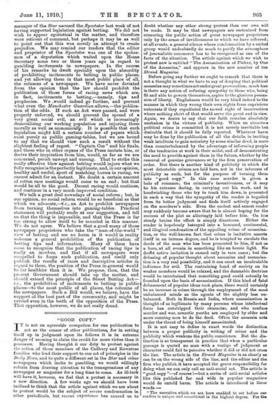THE " STAR'S " BETTING TIPS.
Wdo not think that any good ' purpose will be served by prolonging the discussion of the responsi- bility of the proprietors of the Star for the policy and action of that paper in the matter of betting and incite-. ments to betting. We have expressed our mind on this subject quite plainly, and have stated what are the grave moral evils which must follow from speaking with two voices,—i.e., from' men who regard betting as a grave evil, and incitements to betting as a vice, continuing to publish such incitements to betting in a newspaper which is under their control. In our opinion, such action is absolutely indefensible. We hold that incitements to poor men to bet are wrong ; but we realise that there are plenty of people who do not share our view, and who do not see any more harm in such incitements than in incitements to waste money in the purchase of quack medicines, spirits and cigars, empty novels, or other luxuries. We are not going to say that our view is so certainly the right view that any man who takes the opposite view must be wrong and an enemy of the human race, as we should of course all say of incitements to murder. Men have a right to their own opinion as to whether it is wrong or allowable to offer facilities and incitements to betting. What we do say is that it cannot be right in any circumstances for those who hold that betting is an evil in itself, and incitements to betting a grave moral offence, to supply facilities for betting, and to authorise the offering of ingenious forms of incitement to betting. Judged by whatever creed, sinning against a. man's own light must always be wrong. No doubt it is an exceedingly common form of wrongdoing, but that does not excuse it. If a man asks himself in regard to a particular action the question, " Am I doing right ? " and can answer, " I see no harm in it," he may be absolutely wrong in his self- acquittal, but at any rate he is not guilty of cant. If he has to answer his question, " My action is wrong," and then continues to take that action, he stands self-con- demned. That apparently seems a very hard saying to a great many people, but it is one which no amount of sophistry can obscure. A large band of critics have told us, some in public and some in private, that if we realised what thoroughly good men the members of the Cadbury and Rowntree families who own the Star are, we should feel exceedingly sorry for the action we have taken. Those who argue thus entirely mistake our attitude. We fully realise that the members of the families in question are good men, and have done noble public work. We most willingly and unfeignedly admit that in the matter of good works and private morals they tower head and shoulders above the editor and proprietor of the Spectator, and move on a moral plane infinitely above him. We write this not in irony, but in full sincerity. We have taken up this question, not because we do not recognise that the proprietors of the Star are in many matters thoroughly good and praiseworthy men, but because we do recognise it. There is, however, another matter which we recognise, but which our critics apparently do not, and that is that the essential sin is sinning against the light, and that is ten times worse for a good man to do wrong than for a man who is indifferent to or ignorant of moral questions. The world in general is quite right to exact a higher standard of action from men of good professions and intentions than from those who make little or no pretension to goodness. Christ exacted a standard from the young man of great possessions, and also of great professions, which He would not have exacted from a publican or a Roman centurion. We are not theologians or moral philosophers, but we presume that the condemnation of cant, which is the special mark of the purest form of Christianity, and seems to be instinctive in the human mind, is due to the fact that cant poisons goodness at the source, and gives an excuse which men are always ready and eager to take in the matter of compromises with evil. When a man wants to do good in general, but to do a little evil "on the quiet," or, as he might say, in the hope that good may come of it in the end, or a year or two hence, or in order to help Liberal principles, or to score off disagreeable political rivals who, as he believes, have a bad influence on public affairs, there is nothing so precious to him as to be able to point out that So-and-so, whom every one admits to be the best of men, claims a certain amount of accommodation for his bills in the Bank of Virtue. " The manager there is a reasonable man, and makes no objection if the bills are a little soiled." Let us say, then, once again that we have undertaken the disagreeable task of speaking out, not because we think the persons of whom we have spoken are bad. men, but because we recognise how good are their intentions, and as a rule how well they have carried them into practice. We know that it seems utterly topsy-turvy for the Spectator to reprove members of the Cadbury and Rowntree families on a point of morals ; but, after all, what can we do,—unless, of course, we adopt the view that the persons in question can do no wrong and are above criticism?
Before we leave this part of our subject we may note that it has been said in a good many quarters that we have not really heard the true defence of the proprietors of the Star, and that if we knew it we should think and write very differently. We can only say in regard to this allega- tion that the editor and manager of the Star, who, since he waited for three weeks, we have the right to presume was in communication with his proprietors, last week put forth a reasoned defence of their position at very great length. Since no other defence has appeared, and as Mr. Parke's defence has not been repudiated by the proprietors, we must regard it as the official defence. We dealt with it last week, and will only say here that it was absolutely unconvincing. The only attempt at argument was an attempt to show that the Spectator was acting from tainted motives. But even if this were true, how could it affect the case ? Assume our motives to be as evil as those described in another column by our correspondent Mr. Norman, and the case against the proprietors of the Star would not be altered by one hair's-breadth. Satan rebuking sin may be an amusing spectacle, but no sane man has ever yet argued that such rebuke turned sin into righteousness. To prove the Spectator the author of all wickedness can never make it right for people who abhor incitements to betting to incite to betting. A good deal of misapprehension seems to have incidentally arisen as to the Spectator's own view in regard to betting. We will therefore shortly state that view. In this matter we adhere to the attitude which was adopted by the Spectator some forty years ago, and has constantly been maintained in these columns,—namely, that it is impossible to make out that there is anything wrong in betting or playing games for money per se. It is entirely a question of degree. For men to bet to excess —i.e., to gamble—is of course an evil, and an evil of a very serious kind, because gambling easily becomes a passion, and a very absorbing and degrading passion. For these reasons it is indeed arguable, though it is not an argument with which we agree, that betting so easily becomes a social vice that all betting must be regarded as not only inexpedient but as vicious, and therefore ought to be forbidden by law. To put down all betting by law—that is, all wagering of money on chance—would be quite impossible. We are bound, indeed, in Burke's words, to bear with inconveniences until they fester into crimes. It is, however, possible to prevent people from betting in public or offering incitements to and facilities for betting, and this the law already does, though unfortunately only partially. Betting in public places has festered into a crime. Owing to the terrible evils that flow from unrestrained gambling and betting, the law punishes most severely the keeping of public gaming-tables and betting in public places, and in fact, if not in words, the carrying on of the profession of a bookmaker. In such prohibition we believe the law to be absolutely justified ; but it does not go far enough. So demoralising has betting proved to the poorer classes of the community, and so insidious are the appeals made to poor men to risk far more than they can afford, that we would deal most drastically with incitements to gambling on races. In our opinion, it is a piece of monstrous fatuity, nay, hypocrisy, on the part of the State to harry book- makers off the streets, and yet to allow the newspapers to flood not only our streets but our homes with incitements to betting. While a policeman is arresting a bookmaker at a street-corner, half-a-dozen newspaper boys may within a radius of a few yards be lawfully urging men to buy papers which notoriously are devoted to the spread of gambling, and are bought for no other purpose. What is the sense of enacting that "any person frequent- ing or loitering in streets or public places, on behalf either of himself or of any other person, for the purpose of book- making, or betting, or wagering, or agreeing to bet or wager, or paying or receiving or settling bets," shall be subject to fine and imprisonment, while we permit the newspapers to provide the machinery under which the person above described carries on his work? The Street Betting Act of 1906 declares that " any constable may take into custody without warrant any person found com- mitting an offence under this Act, and may seize and detain any article liable to be forfeited under this Act." Why is not a newspaper one of the " articles liable to be forfeited under this Act," and why are the incitements to betting of the Press not to be regarded as incitements to commit an offence under this Act ? The editor and manager of the Star &Groused the Spectator last week of not having supported legislation against betting. We did not wish to appear egotistical in the matter, and therefore were reticent of comment, but perhaps it may be as well to point out that this was merely an attempt to create prejudice. We may remind our readers that the editor and proprietor of the Spectator was one of the spokes- men of a deputation which waited upon the Home Secretary some two or three years ago in regard to gambling incitements in newspapers. In the course of his remarks he dwelt specially upon the absurdity of prohibiting incitements to betting in public places, and yet allowing them in that most public place of all, the columns of a newspaper. We have never deviated from the opinion that the law should prohibit the publication of those forms of racing news which are, in fact, incitements to betting,—namely, tips and prophecies. We ,would indeed go further, and prevent what even the Manchester Guardian allows,—the publica- tion of the odds. If such an Act were passed, and were properly enforced, we should prevent the spread of a very great social evil, an evil which is increasingly demoralising our working population and injuring them morally as well as economically. It is possible that such legislation might kill a certain number of papers which exist purely as public gaming-tables, but we are bound to say that we should view such a result without the slightest feeling of regret. " Captain Coe " and his finals, and those who in other organs of the Press imitate him, or derive their inspiration from him, would, as far as we are concerned, perish unwept and unsung. That-to strike this really effective blow against betting would injure what we fully recognise is the perfectly legitimate, and, in our opinion, healthy and useful, sport of matching horses in racing, we cannot admit for an instant. No doubt a certain amount of rotten race meetings would come to an end ; but that would be all to the good. Decent racing would continue, and continue in a very much improved condition.
We talk a great deal nowadays of social reform • but, in our opinion, no social reform would be so beneficial as that which we advocate,-4.e., an Act to prohibit newspapers from turning themselves into gaming-tables. Practical statesmen will probably smile at our suggestion, and tell us that the thing is impossible, and that the Press is far too strong to allow itself to be muzzled in this manner. We do not agree. We believe that a good many of those newspaper proprietors who take the " man-of-the-world " view of betting and see no harm in it would in reality welcome a general prohibition of the publication of betting tips and information. Many of them have come to recognise that the publication of racing tips is really an incubus, and that if all newspapers were compelled to forgo such publication, and could only publish the results of races and descriptive articles in regard to them, the position of the Press in general would be far healthier than it is. We propose, then, that the present Government should take up the matter, and should extend the principle of the Street Betting Act- i.e., the prohibition of incitements to betting in public places—to the most public of all places, the columns of the newspapers. Such a Bill would, we believe, have the support of the best part of the community, and might be carried even in the teeth of the opposition of the Press. That opposition, however, we do not really dread.
















































 Previous page
Previous page